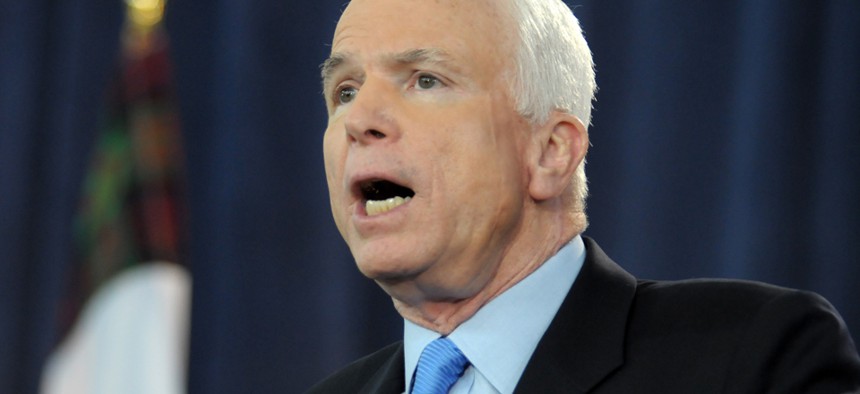
"We have to go in, and it's more than pin-prick airstrikes," Sen. John McCain , R-Ariz., said Thursday on Fox News. Alan Freed/Shutterstock.com
GOP Hawks Push Obama to Up the Ante After Foley
Push includes new support for U.S. ground troops, if not (yet) a full-scale re-invasion of the country.
The execution of American journalist James Wright Foley has spurred a fresh round of calls, mainly from Republicans, for President Obama to expand his limited U.S. military mission in Iraq.
That push includes new support for U.S. ground troops, if not (yet) a full-scale re-invasion of the country, to combat the Islamic State of Iraq and the Levant.
"We have to go in, and it's more than pin-prick airstrikes," Sen. John McCain (R-Ariz.) said Thursday on Fox News. "We're going to need more boots on the ground, and it does not mean combat troops. It does mean a significant increase."
McCain, one of the foremost G.O.P. hawks and a longtime critic of Obama's Iraq policy, praised Obama's statement Wednesday calling the Islamic State a "cancer." But he harshly criticized what he characterized as the president's policy of trying merely to "contain" ISIL.
"We don't have to contain ISIS," he said. "We have to defeat ISIS, and we have to do whatever is necessary."
The U.S. has conducted a total of 90 airstrikes across Iraq over the last two weeks, military officials said, and while Obama has continued to rule out "combat troops on the ground," his rhetoric against ISIL grew considerably sharper after Foley's death in a horrific videotaped beheading.
We will be vigilant and we will be relentless. When people harm Americans, anywhere, we do what’s necessary to see that justice is done. And we act against ISIL, standing alongside others.
Texas Gov. Rick Perry (R), who despite his indictment is considering a presidential run in 2016, joined the fray on Thursday. In a speech at the conservative Heritage Foundation in Washington, he called for a significant expansion in the air campaign to confront ISIL with "overwhelming force" both in Iraq and in Syria, where the terrorist group gained strength over the last year.
Clearly, more airstrikes are necessary. Nothing less than a sustained air campaign to degrade and destroy ISIS forces is required.
Other senior Republicans also called for an expansion of the U.S. military involvement, although with less specificity than either McCain or Perry.
"A piecemeal approach using standoff strikes in Iraq to contain this threat won’t be sufficient for long," said Claude Chafin, spokesman for Rep. Howard "Buck" McKeon (R-Calif,), chairman of the House Armed Services Committee. "The threat of ISIS to the United States and the West has been and continues to be clear and real. The president needs to clearly articulate a strategy to defeat ISIS in Iraq and Syria, and he needs to do so soon."
House Majority Leader Kevin McCarthy (R-Calif.) said on Twitter that the Islamic State "must be confronted directly."
My prayers are with the family & colleagues of James Foley. #ISIS has proven to be the purest form of evil & must be confronted directly.
— Kevin McCarthy (@GOPLeader) August 21, 2014The rise of the Islamic State has renewed the decade-old debate about the capabilities – and limitations – of U.S. military power in the Middle East.
Rep. Adam Smith (D)/AP
In interviews with The Wire, Democrats and military experts pushed back on the suggestion that the U.S. could simply defeat ISIL without an invasion of the region even larger than the one that failed to quickly secure Iraq in 2003.
"I completely disagree" with McCain, Rep. Adam Smith (Wash.), the top Democrat on the House Armed Services Committee, told The Wire on Thursday.
I think that’s an incredibly simple-minded approach, as if there was some button out there today that we could simply push to destroy them and we’re choosing not to push it. Believe me, if that button existed, we would push it."
Smith said he largely supported the strategy that Obama was pursuing to give arms and air support to Kurdish forces fighting on the ground, while pushing the incoming Iraqi prime minister, Haider Al-Abadi, to form a new and more inclusive government that could unify the country against ISIL.
But Smith broke a bit with the president on the question of ground troops, saying the U.S. strategy could including special forces operations like the one that tried unsuccessfully to free Foley and other American captives last month.
The obsession with whether or not there’s any U.S. military boots on the ground in a supporting role or in a special operations role – I think that is misplaced. I think it is quite correct to say that it would be a huge mistake for us to launch an attempt to lead a full-scale military operation. That is not the solution in this region.
Stephen Biddle, an adjunct senior defense fellow at the Council on Foreign Relations, faulted both the Obama administration and its Republican critics who are pushing for an expanded operation in Iraq.
"A limited U.S. ground presence isn't going to destroy ISIL, either," Biddle told The Wire. When a force of 130,000 American soldiers couldn't fully defeat a weaker insurgency in 2006, "it's very hard hard to see why a much smaller effort is going to work now."
There's a huge disconnect here between people's assessment of the threat and what they're willing to do about it."
Obama's decision to launch air strikes has also prompted calls for a new congressional authorization of force when lawmakers return from their August recess.
Don't bet on it, Smith said.
"This Congress and the president do not exactly get along too well," he said, "so coming up with something incredibly complex like an authorization for the use of force – I just don’t see us being able to pull something like that together."
(Image via Alan Freed / Shutterstock.com)






